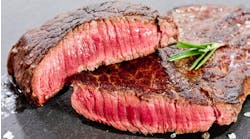In a case that could determine the validity of all check-off marketing programs, the U.S. Supreme Court last month heard oral arguments in a lawsuit claiming the "Beef -- It's What's for Dinner" campaign unfairly taxes all cattle producers.Actually it’s a consolidation of two cases â Veneman v. Livestock Marketing Assn. and Nebraska Cattlemen Inc. v. Livestock Marketing Assn. â which themselves are countersuits against the Livestock Marketing Assn., the Western Organization of Resource Councils and several individual cattle producers from South Dakota and Montana. Those groups filed suit in federal court in December 2000, claiming the advertising campaign by the Cattlemen's Beef Promotion and Research Board (the Beef Board), conducted under the auspices of the U.S. Dept. of Agriculture, violates their First Amendment right to free speech.
Congress created the Beef Board when it passed the Beef Promotion and Research Act of 1985. The law authorized the secretary of agriculture to fund the campaign through a dollar-per-head tax on every beef cow sold in the U.S. In 2003, cattle producers paid $82.7 million to support the Beef Board's ads and those of its state counterparts, according to a Washington Post story.But the claimants in the first cases say they disagree with the content of the ads. They claim the generic pro-beef message does not distinguish between domestic or imported beef or grain-fed versus grass-fed, nor with the differences among cattle producers.The opponents of the beef campaign are counting on earlier Supreme Court decisions that the First Amendment prevents people from being compelled to finance speech. The court struck down a similar mushroom promotion program in 2001. "First Amendment values are at serious risk if the government can compel a particular citizen, or a discrete group of citizens, to pay special subsidies for speech on the side that it favors," Justice Anthony Kennedy wrote for the court in the mushroom case.Supporters of this and other checkoff programs hope the court uses and clarifies some recently introduced terminology known as "government speech." They argue the essential pro-beef message was determined by Congress and is therefore government speech, akin to armed services recruitment ads. If the court lets the cattle producers refuse to pay their assessments for the ads, then every pacifist should be able to withhold the portion of his income taxes that funds "An Army of One" ads.The "Pork: The Other White Meat" and "Got Milk?" advertising campaigns also have appealed to the Supreme Court, having been declared unconstitutional by federal appeals courts. Also watching with great interest are federal promotional campaigns for products such as potatoes, eggs, honey, watermelon, popcorn and cotton.The 8th Circuit U.S. Court of Appeals in St. Louis agreed last year with the opponents. The Bush administration, supported by a group of Nebraska cattle producers, appealed, setting the stage for the Supreme Court case. In 1997, the court upheld a federal promotional levy on growers of peaches and other "tree fruit" in California, ruling the tax should be seen as part of a broader web of regulations that limited competition in that business.A decision is expected by July.


